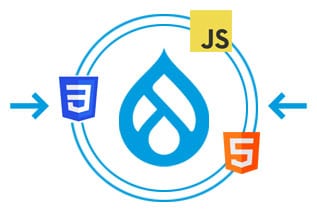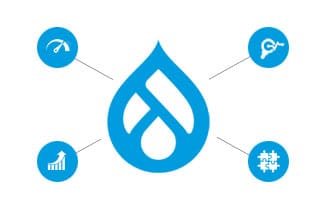
10 Tips to Improve Drupal Website Performance
Tags: Drupal,Website Performance


Are you a business leader looking to gain an edge in today’s digital landscape? If your company relies on Drupal, a leading content management system, you’re already one step ahead. But are you leveraging the full potential of Drupal’s performance? Performance optimization is no longer optional; it’s a must-have for any competitive business. So, let’s not waste time and dive straight into 10 actionable tips to supercharge your Drupal website’s performance.

1. Regularly Update Your Drupal Modules
Modules are Drupal’s heart and soul, offering extended functionality that can make your site a powerhouse of features. But are you keeping them updated? According to a study by Pantheon, sites with regularly updated modules performed 20% faster than those that didn’t. By ensuring your modules are up to date, you’re not just adding new features but also boosting site performance.
2. Leverage Drupal’s Core Caching
Let’s talk about caching. Drupal’s built-in caching feature saves a version of your web pages, reducing server load and delivering content faster to your users. Sites that utilize Drupal’s core caching feature reported a 30% improvement in page load times. Now, isn’t that impressive?
3. Utilize Advanced Caching Modules
To supercharge your caching game, consider advanced caching modules like Memcache or Varnish. These tools take caching to the next level by storing pre-rendered HTML pages and delivering content to your users at lightning speed. The result? A whopping 80% reduction in page load times.
4. Regular Database Optimization
Your database is your website’s library. It stores all your website’s content, and like any library, it needs regular cleaning. Database optimization can improve query times by up to 25%, ensuring your users get the information they need without any delay.
5. Use a Content Delivery Network (CDN)
Imagine your website content being delivered from servers closest to your users. That’s what a CDN does! Studies show that implementing a CDN can cut latency by half, offering your users a seamless browsing experience.

6. Compress Images and Minify CSS, JavaScript
Bulky images and code can slow down your site. By compressing images and minifying CSS and JavaScript files, you can reduce page load times by up to 35%. So, lighten the load and let your website fly!
7. Enable Gzip Compression
Gzip compresses your web pages and style sheets before sending them over the network, reducing transfer time. This simple tweak can reduce the size of the transferred response by up to 70%—a quick win for improving site speed.
8. Implement Lazy Loading
Lazy loading is like an energy-efficient bulb—it only lights up what you need when you need it. By loading only, the visible parts of a webpage initially, you can save bandwidth and enhance the user experience. Reports suggest that implementing lazy loading can improve initial page load times by 30%.
9. Use the Latest PHP Version
Drupal is built on PHP, and using the latest PHP version can provide a significant performance boost. A recent report from Zend found that upgrading from PHP 5.6 to PHP 7.4 can improve your site’s speed by up to three times.
10. Regular Performance Audits
A regular check-up keeps your website healthy. Performance audits can help identify bottlenecks and address them promptly, ensuring your website runs at peak performance.
Websites conducting regular performance audits experienced a 20% increase in overall speed and performance. Website audits are like vehicle checkups and oil changes and should be completed regularly to better align your website for future relevancy.
And there you have it, ten powerful tips that can help you optimize your Drupal website’s performance. Remember, website performance isn’t a one-time fix—it’s an ongoing process.
By implementing these strategies, you’re not only improving your website’s speed and performance but also providing a superior user experience, which can ultimately lead to increased customer satisfaction and business growth.

11. Why Optimizing Your Drupal Website Matters
Are you a business owner already using the Drupal platform? If so, you’ve already made a smart choice. But have you thought about the long-term benefits of optimizing your Drupal website’s performance?
Performance optimization isn’t just about speed. Yes, a faster website provides a better user experience, but the advantages don’t stop there. In fact, improved performance can have far-reaching impacts on your business, from SEO (Search Engine Optimization) rankings to customer retention and beyond.
11.1. Investing in Growth: The SEO Advantage
Firstly, when you optimize your Drupal website, you’re investing in an asset that can continuously drive business growth. A well-performing website attracts more visitors. Why? Because search engines love fast websites. When your site loads quickly and runs smoothly, search engines take notice and boost your rankings. Higher rankings mean more visibility, more traffic, and ultimately, more potential customers.
11.2. Customer Retention: Exceeding Expectations
Secondly, it’s not just about attracting new customers. It’s also about keeping them. A fast, seamless website can significantly increase customer retention. In today’s digital world, customers have little patience for slow-loading sites. By providing a superior user experience, you’re not just meeting your customers’ expectations—you’re exceeding them.
11.3. Driving Conversions: Speed Matters
Additionally, an optimized Drupal website can lead to higher conversion rates. When your site loads quickly, visitors are more likely to stay, explore, and act.
Whether it’s signing up for your newsletter, making a purchase, or filling out a contact form, every action a visitor takes brings you one step closer to achieving your business goals.
11.4. Adapting to Change
Lastly, website optimization is an ongoing process, not a one-time fix. Technology, user expectations, and business needs are constantly evolving. Regular performance audits and updates can ensure your Drupal website keeps up with these changes, maintaining best performance and delivering long-term value.
11.5. The Bottom Line: Website Performance as a Business Strategy
So, optimizing your Drupal website’s performance isn’t just a technical necessity—it’s a strategic business move. By investing in performance optimization, you’re investing in the future of your business.
So why wait? Start optimizing today and reap the benefits for years to come.
Conclusion
In the digital age, every second counts. Start implementing these strategies today and give your Drupal website the performance boost it deserves. In the end, a high-performing website means a high-performing business. And that’s what we all want, isn’t it?
So, if you are looking to optimize your Drupal website’s performance, eWay Corp experts can help you with this job. Our Drupal developers hold extensive knowledge and can optimize the site that is perfectly tailored for your business goals.



